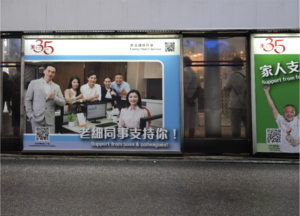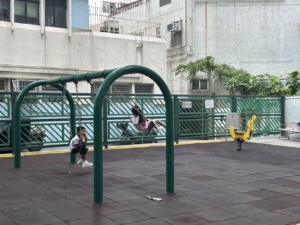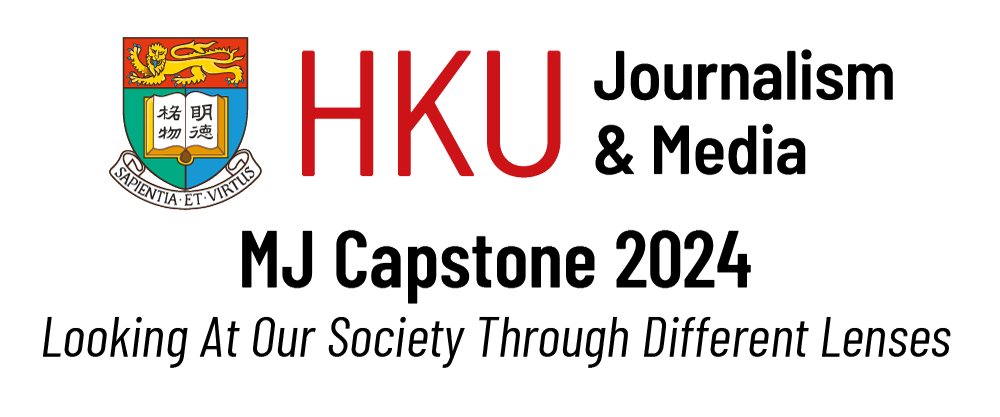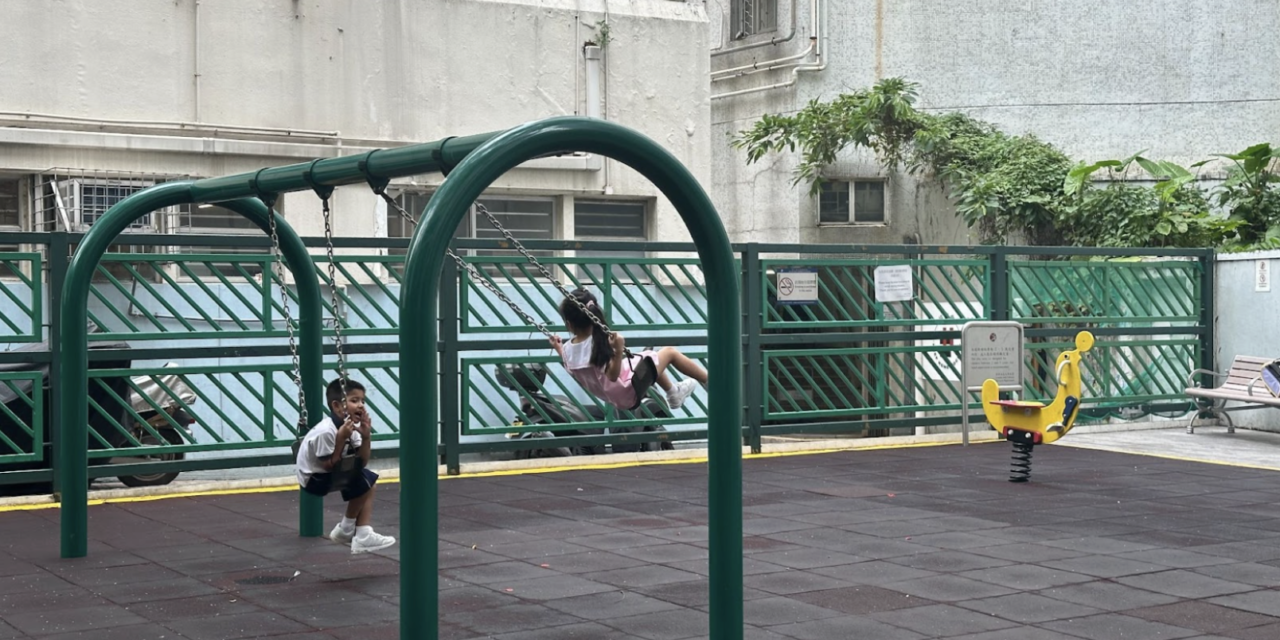By Yiyang He and Dan Wang
HKU Journalism and Media Studies Centre
HONG KONG – Every Saturday morning, Queenie Lau enjoys a leisurely walk in a park in Sai Ying Pun while her 5-month-old daughter naps in a baby carrier.
The quality time between the 35-year-old mother and her baby became more precious since she started working two jobs. To manage the financial challenges of raising a newborn, Lau sells insurance and also works as a headhunter.
To lessen the stress for new parents, the Hong Kong government recently announced it would give a HK$20,000 (US$3,255) bonus for households with new babies born from Oct. 25, 2023 to Oct. 24, 2026.

The Department of Health’s posters to encourage couples to have more children. Photo: Dan Wang
But Lau, who has received the bonus and has yet to figure out how to spend it, said it won’t go very far.
“It’s only able to cover our kid’s milk powder fees for three to five months, which is a very small amount compared to all other costs we need to spend on the kid,” she said.
As of March 15, 2024, about 10,000 new parents received the bonus as the government spent over HK$193 million on the program, according to a government statement.
Hong Kong is trying to tackle its most severe decline in birth rates to date. The city’s fertility rate – the average number of children a woman has in her lifetime – has seen an almost 30% decline over four years, from 1.06 in 2019 to 0.75 in 2023, according to the latest government statistics. The shift has left Hong Kong with one of the lowest fertility rates in the world.
Reversing the trend was one of the key priorities in Hong Kong Chief Executive John Lee’s 2023 policy address. In addition to the HK$20,000 cash allowance, the government also announced other incentives including an expansion of childcare services and easier access to public housing.
But the implementation of the new policies has not made a measurable impact yet. A survey by the Hong Kong Women Development Association, or HKWDA, conducted from January to February 2024, showed that only 26% of over a thousand respondents are willing to have babies. This is only 2 percentage points higher than the result of a year ago, before the introduction of the new incentives.
“Giving people money when they have children is not a terrible idea because having children is expensive,” said Dr. Stuart Gietel-Basten, a professor of social science and public policy at the Hong Kong University of Science and Technology. “But saying that it’s a reason to encourage people to have more children, that doesn't work.”
A representative for Wing-Hing Cheuk, the deputy chief executive of the government’s administration wing, referred HKU Journalism to his previous statement to the Legislative Council in response to a request for comment.
“The government does not consider that the introduction of the baby bonus scheme alone would be able to substantially increase the fertility rate,” he said in the Nov. 2023 statement. “We hope that these measures coupled with enhancement of child care support and increase in tax concessions, etc. would help make young families to positively consider adding new members to their families.”
The cash allowance received only a tepid welcome among Hongkongers surveyed by HKWDA. The bonus was rated 3.14 out of 10, meaning the respondents didn’t really feel it boosted their willingness to have a baby. Other measures’ ratings were slightly higher, ranging from 3.65 to 5.01.
But all the measures are still not enough to support couples, according to the survey. About 77% of respondents found the government’s current support to families with children inadequate, while only 6% thought it was sufficient. The rest said they were not sure.
“It’s easy to have a baby, but very difficult to take care of a baby nowadays,” Shun-shun Chan, the vice president of HKWDA, told HKU Journalism in an interview.
Chan added that women in Hong Kong face financial pressure when they have to give up their jobs in order to take care of babies.
Hong Kong’s aging population will become even older due to persistently low fertility rates. The city’s Census and Statistics Department forecasts that the proportion of individuals aged 65 and above will rise to 36.0% by 2046, compared to 22.3% in 2022.
Baby bust across East Asia
The baby bust is not only happening in Hong Kong. Across East Asia, the fertility rates in China, Japan, South Korea, and Singapore have for decades hovered below 2.1, the replacement rate that demographers say is needed to keep the population stable. Each of the countries also lags the world’s overall total fertility rate, World Bank data show.
South Korea’s government has been offering far more aggressive subsidies than Hong Kong to tackle its low fertility rate. President Yoon Suk Yeol said in 2022 that the country has spent more than US$210 million since 2006 to boost the fertility rate. Despite the subsidies, South Korea’s fertility rate still fell to 0.72 in 2023, the latest government data show.
The low fertility rates in East Asia are tied to uneven gender roles, over-education, working, housing, and the cost of living, according to Dr. Gietel-Basten. “It’s difficult for the government to change all of that,” he said.
While advanced economies across East Asia share low fertility rates, some Hongkongers still find other regions a better destination for parenting than Hong Kong. Keith, a financial services professional who is only using his first name for privacy concerns, moved with his wife to Singapore three years ago and only now has started to plan for a new baby. He believes living conditions are better in Singapore and the government provides more subsidies and welfare for parents than Hong Kong.
Singapore’s cash allowance – about US$8,172 for the first child – is more than triple Hong Kong’s newly-enacted baby bonus, which works out to about US$2,564 at today's exchange rates. The subsidy grows for families with three or more kids and the government also offers tax relief for parents with newborn kids, among other benefits.
“If we were still in Hong Kong now, I don’t think we would want to have a kid,” Keith said.
Too little, too late?
Hong Kong’s new benefits have not yet convinced childless married women like Ivy Cheng, a 41-year-old clerk who has no plan to have a baby due to financial concerns. The total income of Cheng and her husband is slightly over HK$30,000 per month, matching the median household income in Hong Kong, according to government data.
“Nowadays the prices for everything in Hong Kong are too high. I just can’t earn enough money to raise a baby,” said Cheng, who got married three years ago. “And if I give up my job for the kid and rely on my husband’s income, I will be stressed out.”

Children play at a local park in Wan Chai, Hong Kong. Photo: Dan Wang
For others, the bonus was simply enacted too late to make a difference. For Kary Fung, a mother of two who lives in public housing at Sham Shui Po, the HK$40,000 bonus for two newborns would have been enough to pay for 20 months of her HK$2,000 monthly rent.
“My younger kid was born just a couple of months before the bonus was enacted, so I was pissed off when I heard of the bonus,” Fung said. “It cannot help a lot, but it’s better than nothing.”
The new cash allowance’s help is still limited for mothers like Fung because it does not address couples’ concerns over the insufficiency of resources for parenting, such as childcare services.
In Hong Kong, childcare services should alleviate parents’ concerns over affordability as the costs are cheaper when compared to hiring a domestic helper. For instance, the cost of daycare services for a child can be as low as HK$64 per day, or roughly HK$1,280 for all the working days in a typical month. On the contrary, hiring a helper typically costs around HK$5,000 per month and the family needs to provide a food allowance and accommodation for the helper. Hong Kong is one of the most expensive property markets in the world, making it harder for families to afford a spare bedroom for a helper, let alone the helper’s food and salary.
However, there is a severe shortage of childcare services in the city. There were only about 2,000 daycare spots for Hong Kong’s roughly 82,000 children who were under two years old in 2021/22, according to a 2023 study by the city’s Legislative Council. This means around 40 babies compete for every daycare spot.
Giving up the source of income to be a stay-at-home mom can be a tough experience among lower-income households. The Hong Kong Council of Social Service last year surveyed 411 lower-income mothers who opted not to hire any caregivers and to take care of kids on their own. About 30% of them reported experiencing postpartum depression.
Workplace discrimination
Although the government has announced it would expand the capability of childcare services in the 2023 policy address, the fear of experiencing discrimination at work is another reason why women in Hong Kong hesitate to become mothers.
Surveys from the Equal Opportunities Commission in 2018 showed that mothers with young children in Hong Kong are less favorable in job applications, leave applications, and promotion opportunities.
“I cannot be promoted during or after my pregnancy. It’s the same for everyone in the company,” said Mrs. Ip, a 33-year-old mother in the finance industry who asked not to give her first name due to privacy reasons. “This is an unwritten rule in my company.”
Dr. Tai-Chor Au Yeung, an assistant professor of sociology and social policy at Lingnan University, called this kind of bias the “maternity penalty.” To prevent such discrimination, he suggested that the employees could be more unionized to fight against labor issues, adding that employers should guarantee a better package of labor rights for workers.
Working mothers have also complained about the length of paid maternity leave in Hong Kong, which is 14 weeks long by law. Lau, the mother of the 5-month-old baby who works two jobs, has already returned to work because her maternity leave ended.
“The maternity leave is too short for me. I have to leave my daughter to the domestic helper when she is still so young,” said the mother who even has to work in her spare time occasionally.
But she feels she has no choice. “If I don't return to work and quit my job, we will face financial pressure to only rely on my husband’s income,” Lau said.
The government last raised women’s maternity leave from 10 to 14 weeks three years ago. In August 2023, the Federation of Trade Unions asked the Chief Executive Lee to further extend the maternity leave to 16 weeks but the government has yet to take action.
Lau said it would be better if the government extended maternity leave or covered more of the cost for childcare services or school tuition fees.
For now, the HK$20,000 bonus sits in her bank account.
“We haven’t figured out how to use it yet,” Lau said.
Advisor: Cezary Podkul

